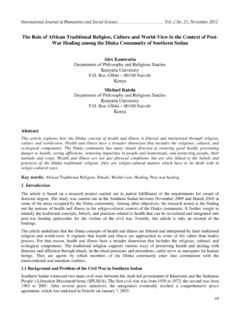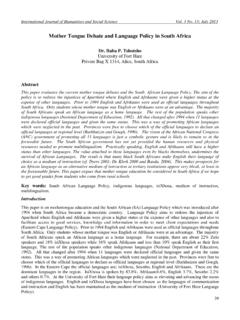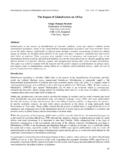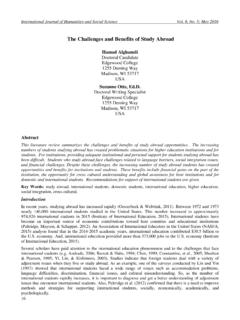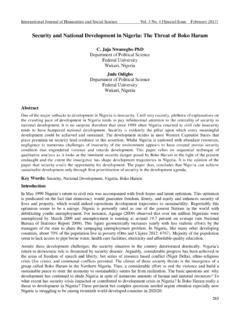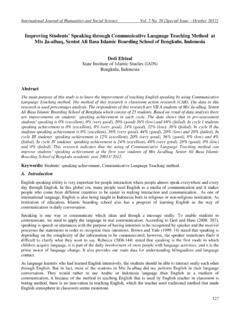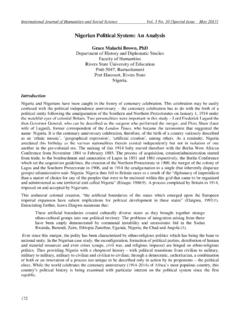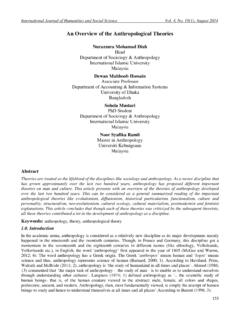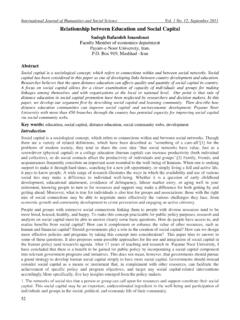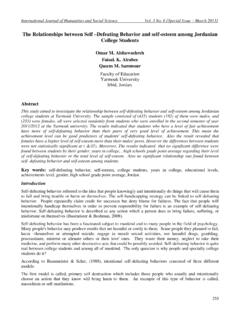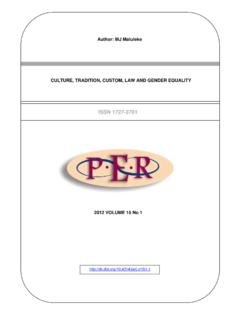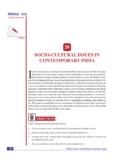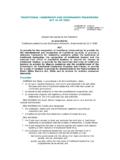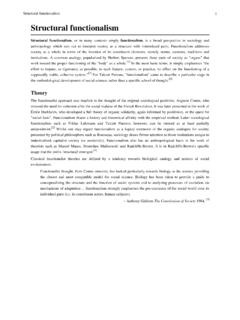Transcription of SOCIO-CULTURAL FACTORS AFFECTING PREGNANCY …
1 International Journal of Humanities and Social Science Vol. 2 No. 4 [Special Issue February 2012]. SOCIO-CULTURAL FACTORS AFFECTING PREGNANCY OUTCOME AMONG THE OGU. SPEAKING PEOPLE OF BADAGRY AREA OF LAGOS STATE, NIGERIA. AJIBOYE, OLANREWAJU EMMANUEL ( ). Department of Sociology Faculty of Social Sciences, Lagos State University, Ojo ADEBAYO KAFILAT ABIMBOLA. Department of Sociology Faculty of Social Sciences Lagos State University, Ojo Abstract PREGNANCY outcomes rank among the most pressing reproductive health challenges all over the world. Globally, an annual estimate of 600,000 women of reproductive age (aged 15-49) died of PREGNANCY related causes, with 99 percent coming from the developing world with Nigeria accounting for well over 10 percent of this figure.
2 This study is an exploratory one. It therefore focuses on SOCIO-CULTURAL FACTORS AFFECTING PREGNANCY outcome among the Ogu speaking people of Badagry area of Lagos State, Nigeria. Triangulation method was used for data collection. A multi-stage sampling procedure was adopted to select 120 respondents. Chi-square technique was used to test the hypothesis for the study. In spite of modernisation, the culture of the people of Ogu Community still play dominant role in shaping their reproductive behaviour. Hence, the study found positive relationship between SOCIO-CULTURAL FACTORS and PREGNANCY outcome among Ogu speaking people of Badagry of Lagos State, Nigeria.
3 Key Words: SOCIO-CULTURAL , PREGNANCY outcome, Reproductive Health, Antenatal, Traditional Birth Attendant, Maternal Mortality. Introduction PREGNANCY outcomes rank among the most pressing reproductive health problems in the world. Globally, an annual estimate of 600,000 women aged 15-49 died of PREGNANCY related causes, with 99 percent coming from the developing world (Population Reference Bureau, 2002; WHO, 2000; Addai, 1998; Wall, 1998;. Salter, 1997) and Nigeria alone accounting for over 10 percent of this total figures (Okolocha et al., 1998). PREGNANCY outcomes may undermine family stability at the institutional level while it may also affect the health and manpower needs of societies at the structural level.
4 Both impacts have implications for individuals, families, communities and society at large. The World Bank (1998) had observed that maternal and infant mortality depend to a large extent on whether women have access to information, education and communication resources requires to provide themselves and their infants with adequate care. The implication of the above is that the achievement of safe motherhood among women to a great extent depends largely on the interaction of several FACTORS in any given human societies. Apart from the conditions of health centers and the FACTORS that affect their use or non-use, the culture of the people, environment where they live and the socio-economic status of women is also strongly associated with PREGNANCY outcomes.
5 It should be mention at this juncture that the culture of people is what best described the group. For instance, a group can best be understood and described based on its cultural practices. This is because people's culture best explains why and how they do what they do and behave the way they behaved. In this exploratory study of socio- cultural FACTORS AFFECTING PREGNANCY outcomes among the Ogu people of Badagry, Lagos State, Nigeria, attempt is made to examine the nexus of interaction between PREGNANCY outcome and cultural practices of the Ogu people of Badagry area of Lagos State, Nigeria. Further, maternal situation among the Ogu people of Badagry, Lagos State is exacerbated by culture of patriarchy which gives men power over women in virtually all spheres of family decision life.
6 133. The Special Issue on Contemporary Issues in Social Science Centre for Promoting Ideas, USA. The exclusion of women from some sensitive family discourse, such as family planning, family size and access and use of maternal health facilities, is usually hinged on cultural beliefs and values designed and sustained by men in order to maintain their domination and subjugation of women (Isiugo- Abanihe, 2003;. Moore and Helzner, 1996; Sen et al., 1994). This study highlights communal and personal values, perceptions, beliefs and practices as it affects PREGNANCY outcome among the Ogu people of Badagry, Lagos State, Nigeria.
7 The Problem In spite of the efforts of the various successive governments both national and international at reducing the rate of maternal and infant mortality all over the world, there is still high incidence of maternal and infant mortality among the Ogu people which is linked to the perceptions, attitudes and practices of the people with regard to PREGNANCY . Evidences have shown that, SOCIO-CULTURAL and economic FACTORS have contributed to the increased incidences of maternal and infant mortality among the people of Ogu community of Badagry. The Ogu people of Badagry are found to have low socio-economic statuses which have further helped to increase their level of poverty.
8 In termd of economic activities, the Ogu people are mostly found in the informal sector, particularly, in the areas of non-farming activities such as fishing, and others. This has probably contributed to their low socio-economic status. The situation described above may not be unconnected with the people's low patronage or inability to utilize the available various modern reproductive health services by the Ogu people. In addition to the poor socio-economic status, the culture of the people is another strong factor which has been found to affect PREGNANCY outcome among this particular group. In spite of social change and modernization, the Ogu people are still strongly adhere to their cultural practice as it relates to PREGNANCY some of which that could be described as obnoxious.
9 The Egun (Ogu) speaking people prefer in their quantum cultures Zangbeto. Zangbeto is highly regarded and respected in Badagry and its neighbouring communities. Zangbeto may be considered as a deity, youth masquerade or a myth used in sustaining the law and order of the society. Zangbeto remained the traditional town police among the Egun (Ogu). In summary, the belief in many of the traditional system and cultural practices could be said to account for the low patronage of modern antenatal clinic and sometimes affects peoples' attitude towards the use of modern medicine, hence, majority of the people are still found patronizing traditional birth attendants.
10 This exploratory study of the SOCIO-CULTURAL FACTORS AFFECTING PREGNANCY outcomes among the Ogu people of Badagry Area of Lagos State, will examines the general attitudinal practices of the people, the culture as a way of life of people, the attitudes of people towards maternal health facilities and Traditional Birth Attendant (TBA) as it affect PREGNANCY outcomes in the study area. Gap in Knowledge Evidences and researches have consistently shown that maternal processes in Africa are prone to crises as a result of multiple SOCIO-CULTURAL and economic FACTORS . For instance, male-domination, low status of women, poverty, cultural beliefs and practices and high fertility combined to affect PREGNANCY outcomes in most societies in the continent, particularly in Sub-Saharan Africa.
